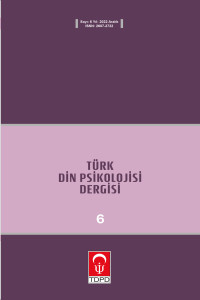Research Article
Book Review
Aim & Scope
The mission of The Turkish Journal for Psychology of Religion (TPDP) is to publish academic studies in the field of psychology of religion in a rich content and quality, contribute to the literature of Turkish psychology of religion, and introduce these studies to the academic community.
The vision of The Turkish Journal for Psychology of Religion (TPDP) is to become one of the world's leading and respected academic journals in the field of psychology of religion in academic journalism.
Within scope of religion and psychology, articles, translation, simplification, book presentation and congress-symposium reviews, etc. studies that related to the research subjects of the psychology of religion have been published in the journal.
Author Guidelines
In the publications of The Turkish Journal for Psychology of Religion (TDPD), APA style is used for both text and bibliography. Therefore, manuscripts that are written according to APA citation system are accepted.
Manuscripts, sent to The Turkish Journal for Psychology of Religion (TDPD), should be original studies related to the psychology of religion centered and / or other sub-fields of psychology that contribute to this discipline, and should have the following characteristics:
Titles in Turkish and other foreign languages should be consistent with the content of the manuscript, and should reflect the manuscript subject in a manner of short, clear and detailed.
Abstracts in in Turkish and other foreign languages should reflect purpose, scope and results of manuscripts.
If paper is based on a presentation as sort of academic study, a master's or a doctoral dissertation, this should be indicated on the first page of the paper.
In the preparation of study, scientific techniques and methods should be followed. Also, information related to subject, purpose, scope, reason for preparation of study and so on should be sufficiently provided, and given in a specific order.
Sources that used in manuscript should be organized in accordance with the writing rules, all kind of used documents should be placed in bibliography, but other documents, not used in manuscript, should not be placed in bibliography.
Research results should be appropriate to the purpose and scope of the research, supplied with baselines and tersely, data or findings not mentioned in the text should not be included.
Page layout: within A4 size, margins should be set to 5 cm from the top, 5 cm from the bottom, 4.5 cm from the left, 4.5 cm from the right.
Text format: should be written in Garamond font with 12 point and titles should be written as bold. Row range of main text part should be full row, its value should be 14 nk. (If it is necessary) row range of footnotes should be full row, its value should be 10 nk within the same text format with the main text, with 9 point. Main text and footnotes should be in the form of Range → Before: 0.3 nk, after: 0 nk.
Text title should be written at the beginning of the first page, with 12 point and capital letters, by centering page, in both Turkish and English.
Author information (at the beginning of the text): after text title, with 2 tow ranges, on the center of page should be placed, and author names and surnames, academic titles, institutions and ORCID should be stated in both Turkish and English. Also contact information of authors (email address) should be implicitly indicated. Sample:
Mustafa KOÇ
Doç. Dr., Balıkesir Üniversitesi İlahiyat Fakültesi
Din Psikolojisi Bilim Dalı
Assoc. Professor, Balıkesir University Faculty of Theology
Department of Psychology of Religion
Balıkesir, Turkey
E-mail: mustafakoc@balıkesir.edu.tr
Orcid no: 0000-0003-1299-7963
Author information (at the end of the text): author information including contact information of author, e-mail address and areas of interest should be given by giving 2 row ranges after the main text, in accordance with pattern that specified by the journal. Sample: Mustafa KOÇ (Doç. Dr.)
Correspondence Address: Balıkesir Üniversitesi İlahiyat Fakültesi (NEF Yerleşkesi) Altıeylül / Balıkesir
E-mail: mustafakoc@balikesir.edu.tr
Areas of Interest: (a) development and childhood in the context of psychology of religion, adolescence, adulthood and elderliness psychology (b) religious orientation and religiosity typology (c) psychology of religious rituals (d) relationship between religion and mental health, (e) Mental health of Muslim-Turkish diaspora, (f) spiritual care and counselling, (g) psychology of death and afterlife (h) relationship between religion and self, (i) religious concept development (j) psychology of religion’s history and literature etc.
After author information, abstract should be written in Garamond font with 11 point, and with 2 row ranges. Turkish and English abstracts should consist of minimum 150 words and maximum 250 words. Within the abstract; subject, scope, importance, purpose and results of the research should be indicated.
After the abstract, keywords consisting of at least 5 and at most 8 words should be placed. The first keyword must be the discipline name (psychology of religion). Then the other keywords fully reflecting the content of the text should be included.
After bibliography in text, with at least 750 and at most 1000 words, extended abstract in English should be written. Subject, purpose and results of the research should be briefly indicated in the extended abstract.
Text; should not exceed 40 pages including tables, figures, photographs and references
According to APA style, citation within the text is as follows: Author surname, publication year: Page numbers. Example: (Pargament, 2001: 46-49)
If the primary sources cannot be reached, when doing citation, the primary source is cited first and then the secondary source which is quoted or transmitted: Example: (Pargament, 2001: cited from 210. Cengil, 2014: 31)
According to APA style, bibliography style is as follows: Author surname, name, publication year, publication name, place published and publisher. Example: (Pargament, K. I. (2001). The psychology of religion and coping: Theory, research, practice. New York: Guilford Press).
If an author’s multiple publications are used in the text, references are written in chronological order in bibliography. If an author’s more than one publications in the same year are used, they are listed as “2008a” and “2008b” in alphabetical order.
Note: For the use of APA Citation Style, examples and detailed information see. https://www.apastyle.org/
Ethical Principles and Publication Policy
The Turkish Journal for the Psychology of Religion (TDPD) is a scientific and international peer-reviewed field journal that published twice a year (June and December)
The language of the Turkish Journal for the Psychology of Religion (TPDP) is Turkish. Manuscripts in English may be published by the decision of the editorial board.
All kinds of language, science and legal responsibilities of the published manuscripts in the journal belong to their authors.
The editorial board of the journal has decided whether the manuscripts should be published or not.
Although the language of the journal is Turkish, manuscripts in other languages may be published by the decision of the editorial board.
Articles, translation, simplification, book presentation and congress-symposium reviews, etc. studies that related to the research subjects of the psychology of religion have been published in the journal.
Manuscripts those sent to the journal should not have been published or decided to be published elsewhere before.
Manuscripts those sent to the journal are not returned.
The manuscripts those sent to the journal are checked with plagiarism software program to see whether they contain plagiarism or not. Studies, having plagiarism reports under 30%, are accepted to publish.
Any fee is not paid for the authors.
After editor’s preliminary examination, the manuscripts, sent for publication to the journal, are sent to two referees determined by the editorial board those are experts in the subject.
In case of positive reports given by both referees, the manuscript is published. But in case of two negative reports given by both referees, the manuscript will not be published. If one referee given a positive opinion and another given negative opinion, the manuscript is sent to a third referee being field expert. In case of negative report given by the third referee, the manuscript is not published. If the third referee evaluates as positive, the final decision about the manuscript is made by the editorial board, by taking into account the content of the reports.
If an opinion is given in the referee reports of the manuscript that are decided to be published, the manuscript is sent back to the author for the necessary corrections.
If an opinion as “could be published, after the necessary corrections” is given in the referee reports of the manuscripts those are decided to be published, the manuscript is sent back to its author to do the necessary corrections. After the corrections are made, the editor decides whether the referees’ corrections are taken into consideration or not, and the final decision is made.
All rights of the publishes belong to The Turkish Journal for Psychology of Religion (TDPD). Without the permission of the publisher, all or part of it may not be printed, reproduced or transferred to electronic media.
Without writing in accordance with the publishing and writing rules, manuscripts those are sent to the journal are not pay into consideration for the evaluation process.
Price Policy
No fee is charged from the authors for the referee and publication process of the articles that sent to the Turkish Journal of Psychology of Religion. All evaluation and publication processes of the articles are free of charge.
Indexes
Journal Boards
Responsible Manager
Editor-in-Chief
Editor
Assistant Editor

I am a assistant professor at Dicle University Faculty of Theology, Department of Philosophy and Religious Sciences, Department of Psychology of Religion. I have studies on topics such as violence, religious violence, radicalization, terrorism, values, salafism, islamophobia and religious coping. I strive to study these issues in more depth.
Editorial Board
Professor of Psychology, Georgia Southern University

1979’da Konya’da doğdu. İlk ve orta öğrenimini Derbent’te tamamladı. 2002 yılında Selçuk Üniversitesi İlahiyat Fakültesi’nden mezun oldu. 2003’te Marmara Üniversitesi İlahiyat Fakültesi’nde araştırma görevlisi olarak göreve başladı. 2004’te “Kendini Gerçekleştirme ve Dindarlık İlişkisi” başlıklı çalışmasıyla yüksek lisansını bitirdi. 2009’da “Prososyal Davranışlarda Dindarlık ve Empatinin Rolü” başlıklı doktora çalışmasına tamamladı. 2008-2009 öğretim yılında Irbid (Urdun), Yermûk Üniversitesi’nde ve 2010-2011 öğretim yılında Londra Üniversitesi’nde araştırmacı olarak bulundu. 2012 yılında Doçent, 2017 yılında Profesör oldu. Halen M. Ü. İlahiyat Fakültesi “Din Psikolojisi” bölümünde öğretim üyesi olarak çalışmaktadır. Eserleri: Psikoloji ve Din, Din Psikolojisi, Empati ve Din, Tanrı’ya Sığınmak, Türbeler.

Advisory Board



I am a assistant professor at Dicle University Faculty of Theology, Department of Philosophy and Religious Sciences, Department of Psychology of Religion. I have studies on topics such as violence, religious violence, radicalization, terrorism, values, salafism, islamophobia and religious coping. I strive to study these issues in more depth.



Copy Editor

Journal Secretariat


Language Editor

Eskişehir Osmangazi Üniversitesi
İlahiyat Fakültesi
Felsefe ve Din Bilimleri Bölümü

Turkish Journal for the Psychology of Religion (TJPR) is licensed under a Creative Commons Attribution-NonCommercial 4.0 International License (CC BY NC).








